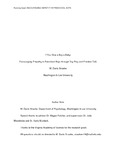If You Give a Boy a Baby: Encouraging Empathy in Preschool Boys through Toy Play and Emotion Talk (thesis)

View/
Author
Straske, Martha Davis
Subject
Washington and Lee University -- Honors in Psychology
Empathy in children
Play -- Boys
Sex differences
Oral communication -- Psychological aspects
Metadata
Show full item recordDescription
Martha Davis Straske is a member of the Class of 2019 of Washington and Lee University. Thesis; [FULL-TEXT FREELY AVAILABLE ONLINE] Empathy, the ability to respond to another's distress with a similar emotion, develops in children as young as two to three years old as their role-taking abilities and emotion regulation skills increase (Feshbach, 1982). Yet, in as early as preschool, moderate gender differences favor girls over boys in empathy-related responding, a psychological measure which incorporates sympathy, personal distress, and empathy (Grusec, Davidov, & Lundell, 2002; Zhou, Valiente, & Eisenberg, 2003). Social cognitive theory suggests that both the environment and cognitions of the child impact this differential development of empathy (Bussey & Bandura, 1999). It may be that parent traditionality influences this empathy difference, such that parents socialize children differently, characterizing young girls as empathic and interpersonal, and young boys as autonomous (Fivush, Brotman, Buckner, & Goodman, 2000). Boys' insufficient practice with baby dolls, in which they take the role of caregiver in pretend play and emotion talk, may also influence the gender gap. The present study was designed to examine mechanisms of empathy development for preschool boys, through doll play (to practice caregiving) and/or emotion talk (to practice identifying and responding to emotions). The baby doll intervention, a guided play with the doll and its accessory, effectively enhanced empathy as those boys responded more quickly to an empathy paradigm than did those in the control condition, which indicates support for the hypothesis. The intervention success suggests the importance of continuing intervention research for the development of socioemotional skills in young children. M. Davis Straske